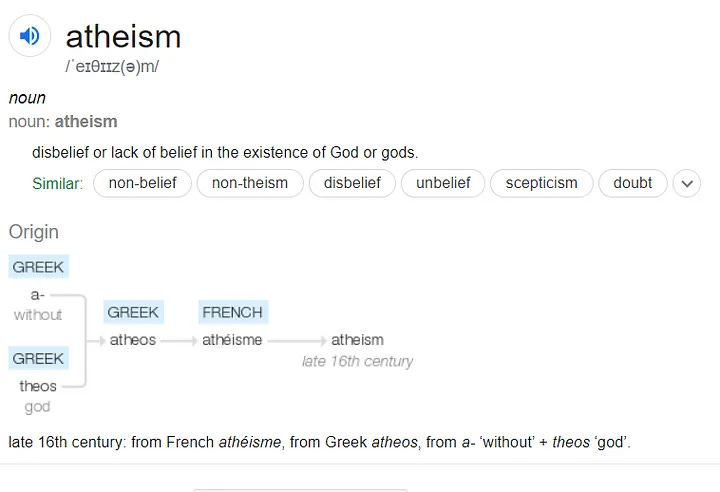Is Atheism the New Christianity?
Supposedly intelligent people often take the vastly different beliefs of billions of people, label them all as ‘religion’ and judge them all as being the same
Religion is a word. That’s all it is.
Yet, even people we class as brainy can get stuck at the level of judgement where they start to make statements about religion as a whole. People judge Christians for their extreme views. But, many atheists seem to be treading the same path toward fundamentalism. I am talking about a tendency to see one’s perspective as superior to everyone else’s.
It’s not that there aren’t mad religious people. It’s not that extreme religious people haven’t caused untold suffering in this world — they have. But blaming religion as a whole is like blaming food for the slightly fishy burrito that gave you extreme diarrhoea at lunch.
What is Atheism?
The intention here is not to judge atheism as a whole. Within atheism, there is no doubt that there are also many sub-beliefs. To judge them all as being the same would be wrong. Some say that atheism is the practice of not believing in anything. I suppose you could label this nihilistic atheism. Some say that it is the belief that we cannot possibly know anything. You could probably label this agnostic atheism.
Atheism, in its truest sense, is the belief that there is no God.
When it comes to saying there is no God, many may believe that this is a scientific or evidence-based view. This belief can become a source of pride for some atheists. They believe their opinion is higher since it is based on science.
The thing is, though — the belief that God doesn’t exist holds about as much weight as a blatant faith in God without evidence.
Neither view is more scientifically-based than the other. It is impossible to prove the non-existence of God. Unless one could see everywhere in the universe, there is simply no way of knowing. To say God exists could either be based on faith or personal experience. But, to say God doesn’t exist has to be based on faith. It absolutely cannot be based on facts.
If someone has had an experience of God, that is their personal experience. Another person has no way of knowing what that experience is. If they use that experience to control or cause suffering, it becomes the business of others. If they do not, no one should be judging.
Religion is a label that designates the vastly different views of billions of people. They range from extreme fundamentalists to pure elemental worshippers. Religion, like most things, is a spectrum. One cannot make a blanket statement that religion is responsible for all of the suffering in the world.
Atheism itself has undoubtedly had its fair share of crazy leaders. One of the most obvious is Chairman Mao, who murdered over a million Tibetans while claiming that ‘Religion is Poison’.
Sure, many atheists claim that Atheism has ‘ no governing dogmatic principles, no rule book and no core ideology’.
These people obviously never read about Mao Zedong.
From 1958 to 1962, (Mao’s) Great Leap Forward policy led to the deaths of up to 45 million people — easily making it the biggest episode of mass murder ever recorded. (Washington Post)
Another ‘ism’ that has caused untold suffering is ‘Capitalism’. One might argue that this is not a religion, and yet it involves a devotional practice consisting of the worship and longing after money and goods.
The idea that this is different from the longing for God’s love is simply a matter of semantics. We worship people who have a large amount of money, goods and status like some religious groups revere people who have achieved higher levels in their community.
There might be an argument that capitalism is different since its object of worship is a ‘real’ object. But what does it matter if the object is real or not? Isn’t it the damage that is caused by the resulting actions of beliefs that is the real issue here?
When someone holds their own belief up as the highest view and then judges other belief systems as inferior — that is fundamentalism.
It is fundamentalism that is the cause of all of the terrible suffering for which religion takes the blame. If one believes in a bread recipe hard enough, it is possible to go to war over bread. When you mention fundamentalism, our ignorant conditioning causes us to think of Middle Eastern so-called terrorists running around blowing things up. But fundamentalism is possible at any level of society by anyone who holds their view as superior to others.
To place all religious views under one label and judge them as being the same is a childish and crude point of view. People widely respect Ricky Gervais for his views on atheism, but often his atheist preaching can begin to sound like sermons for the Atheist Church. I enjoyed his series ‘After Life’, but toward the end, it started to feel like a lecture based on Ricky’s ideas of the meaning of life.
Atheists have to be careful as they can quickly become fundamentalists themselves. Atheist ideas are no different from any ideas. If atheists believe that their opinions are superior, it is hazardous. There has been enough genocide in our modern world to know that fundamentalist ideas don’t necessarily have to be religious to be dangerous.
For this world to become more peaceful, we need less segregation, more understanding and acceptance.
I would not consider myself either an atheist or a religious person. Therefore I have no bias in this argument. This idea is not just a hippy point of view either; it is based on intelligence and trying to find a solution that will end violence.
For too long, we have battled each other’s perspectives, desperate to push our viewpoints onto others. Humans like to think we are the pinnacle of intelligence in the universe, but until we evolve in our minds, we will never be able to see the big picture.
Our viewpoints don’t necessarily matter at all. If we can respect and accept everyone else's opinions (a considerable ask, given our track record), then maybe we can start to reduce the terrible actions that stem, not from the view itself, but from the ‘fundamentalising’ of that view.
Because when you think about it, it is actions that cause harm, not views.




